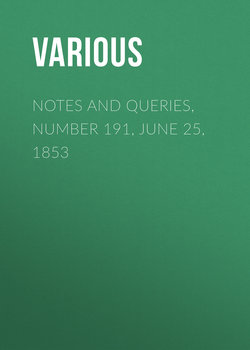Notes and Queries, Number 191, June 25, 1853

Реклама. ООО «ЛитРес», ИНН: 7719571260.
Оглавление
Various. Notes and Queries, Number 191, June 25, 1853
Notes
WITCHCRAFT IN SOMERSETSHIRE
"EMBLEMATA HORATIANA."
SHAKSPEARE CRITICISM
RED HAIR A REPROACH
EXTRACTS FROM NEWSPAPERS, 1714
Minor Notes
Queries
"MERK LANDS" AND "URES."—NORWEGIAN ANTIQUITIES
THE LEIGH PEERAGE, AND STONELEY ESTATES, WARWICKSHIRE
Minor Queries
Minor Queries with Answers
Replies
CORRESPONDENCE OF CRANMER AND CALVIN
"POPULUS VULT DECIPI."
LATIN—LATINER
JACK
PASSAGE IN ST. JAMES
FAITHFULL TEATE
PARVISE
THE CŒNACULUM OF LIONARDO DA VINCI
FONT INSCRIPTIONS
BURN AT CROYDON
CHRISTIAN NAMES
WEATHER RULES
ROCOCO
DESCENDANTS OF JOHN OF GAUNT
THE ORDER OF ST. JOHN OF JERUSALEM
Replies to Minor Queries
Miscellaneous
BOOKS AND ODD VOLUMES WANTED TO PURCHASE
Notices to Correspondents
CLERICAL, MEDICAL, AND GENERAL LIFE ASSURANCE SOCIETY
Miscellanea Historica et Bibliotheca Scotica, Antiqua
Отрывок из книги
Perhaps the following account of superstitions now entertained in some parts of Somersetshire, will be interesting to the inquirers into the history of witchcraft. I was lately informed by a member of my congregation that two children living near his house were bewitched. I made inquiries into the matter, and found that witchcraft is by far less uncommon than I had imagined. I can hardly adduce the two children as an authenticated case, because the medical gentleman who attended them pronounced their illness to be a kind of ague: but I leave the two following cases on record in "N. & Q." as memorable instances of witchcraft in the nineteenth century.
A cottager, who does not live five minutes' walk from my house, found his pig seized with a strange and unaccountable disorder. He, being a sensible man, instead of asking the advice of a veterinary surgeon, immediately went to the white witch (a gentleman who drives a flourishing trade in this neighbourhood). He received his directions, and went home and implicitly followed them. In perfect silence, he went to the pigsty; and lancing each foot and both ears of the pig, he allowed the blood to run into a piece of common dowlas. Then taking two large pins, he pierced the dowlas in opposite directions; and still keeping silence, entered his cottage, locked the door, placed the bloody rag upon the fire, heaped up some turf over it, and reading a few verses of the Bible, waited till the dowlas was burned. As soon as this was done, he returned to the pigsty; found his pig perfectly restored to health, and, mirabile dictu! as the white witch had predicted, the old woman, who it was supposed had bewitched the pig, came to inquire after the pig's health. The animal never suffered a day's illness afterwards. My informant was the owner of the pig himself.
.....
For the use of this figure I may quote from the Shakspeare of France:
Another place on which I had offered a conjecture, and which Mr. A. takes under his patronage, is "Clamor your tongues" (Winter's Tale, Act IV. Sc. 4.) and in proof of clamor being the right word, he quotes passages from a book printed in 1542, in which are chaumbreed and chaumbre, in the sense of restraining. I see little resemblance here to clamor, and he does not say that he would substitute chaumbre. He says, "Most judiciously does Nares reject Gifford's corruption of this word into charm [it was Grey not Gifford]; nor will the suffrage of the 'clever' old commentator," &c. It is very curious, only that we criticasters are so apt to overrun our game, that the only place where "charm your tongue" really occurs, seems to have escaped Mr. Collier. In Othello, Act V. Sc. 2., Iago says to his wife, "Go to, charm your tongue;" and she replies, "I will not charm my tongue." My conjecture was that clamor was clam, or, as it was usually spelt, clem, to press or restrain; and to this I still adhere.
.....